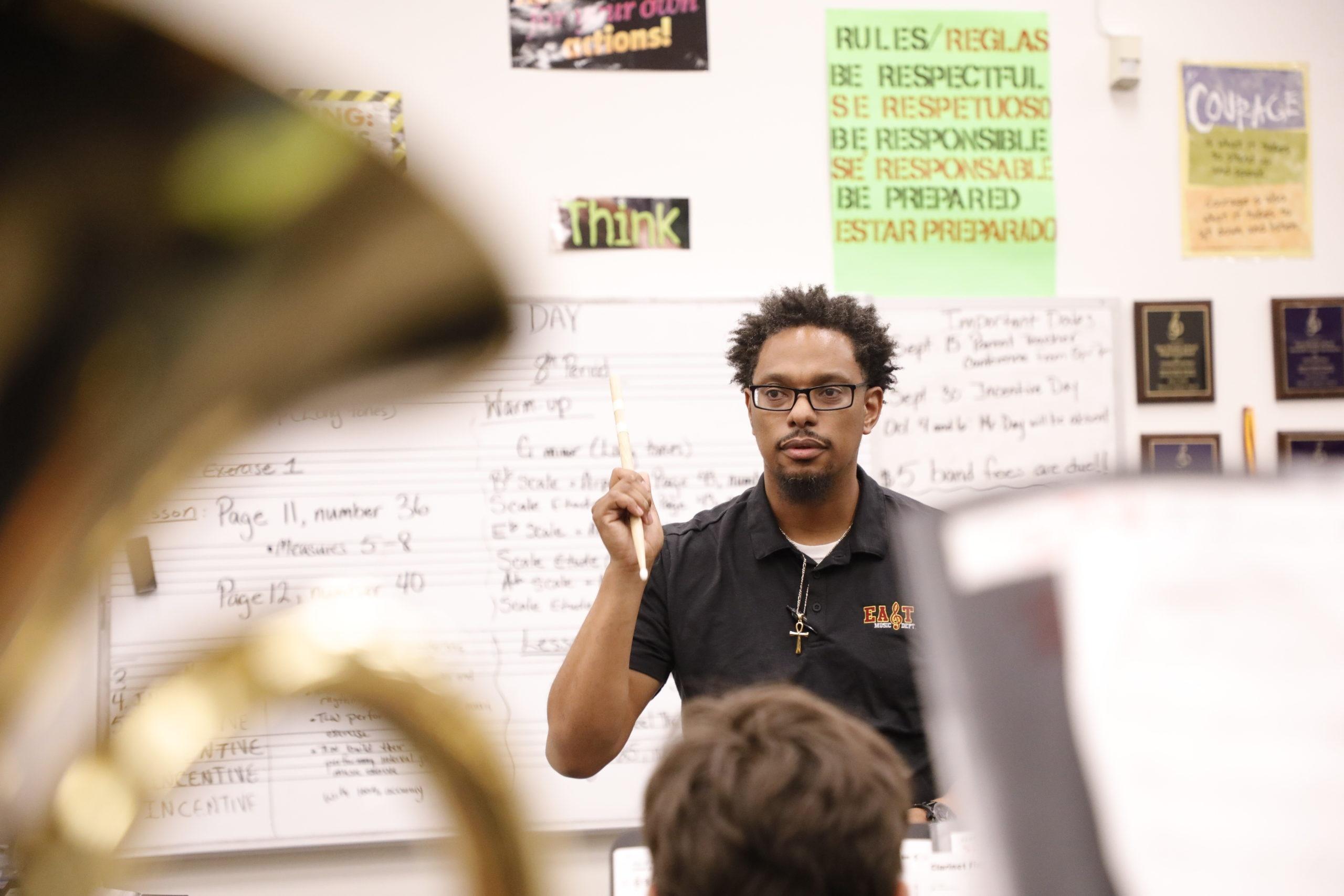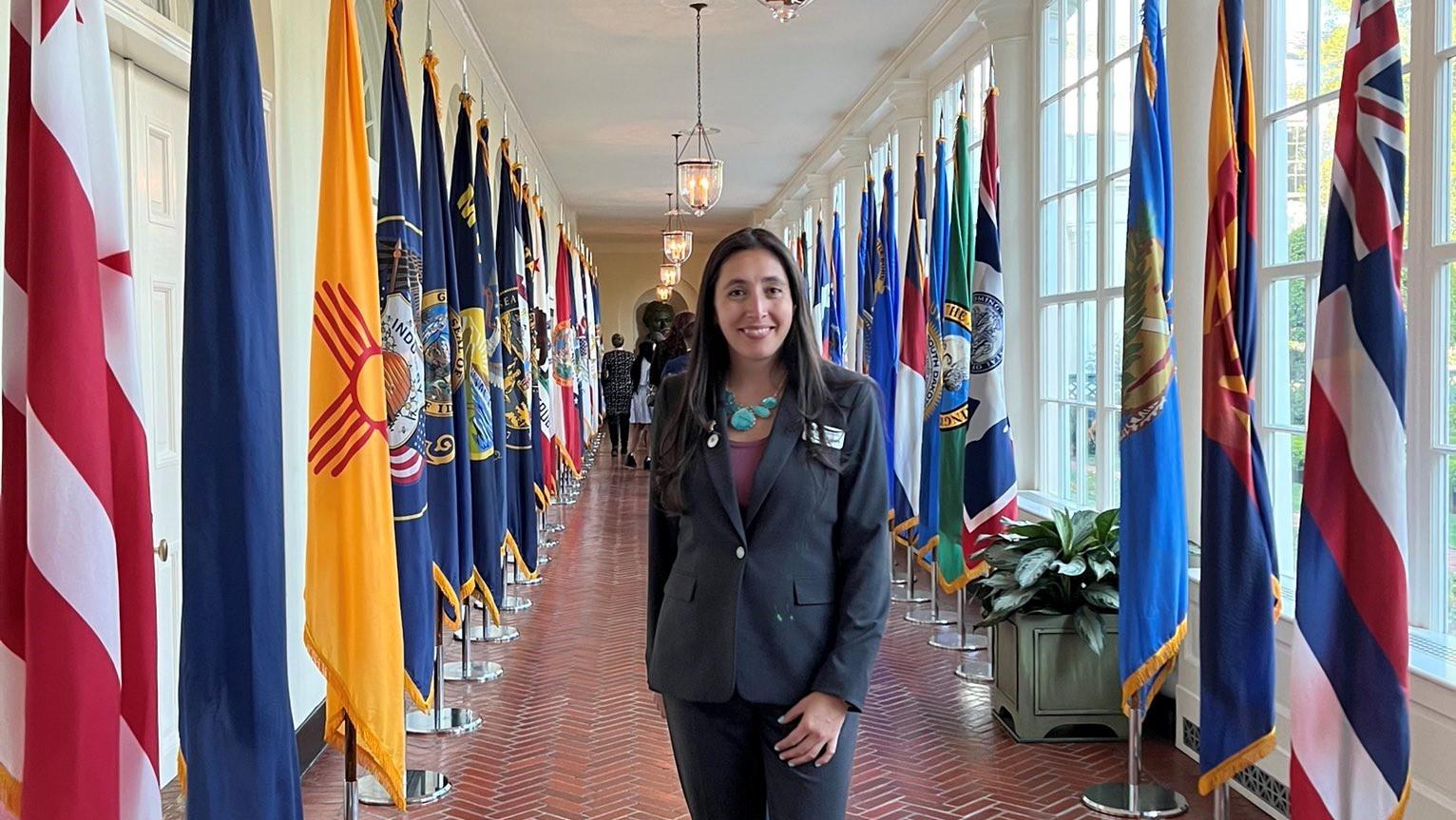Long before he was an award-winning middle school band director in Colorado, Jimmy Lee Day II was a Detroit middle-schooler who rarely attended after-school band practice because he didn’t have a ride home.
His teacher, Mrs. Knox, noticed and offered to drive him home after practices. She quickly became one in a long line of educators who helped Day live up to his potential. Now, Day, who teaches at East Middle School in Aurora, is working to have the same kind of impact on his own students.
The payoff is the performance.
“That is my heaven. All of my troubles and pains are nonexistent,” he said. “It is just me and my students making magic.”
Day, who was recently named Colorado’s 2023 Teacher of the Year, talked to Chalkbeat about his musical influences, his approach to rebuilding band programs, and the touching compliment he received from a student’s older sister.
This interview has been lightly edited for length and clarity.
Was there a moment when you decided to become a teacher?
When I was studying music as an undergraduate at Tennessee State University, I took some courses that required practicums — we would go to a school and observe a teacher teach their class. These really ignited my passion for teaching instrumental music to middle school and high school students.
There were two incidents that made it clear that I was destined for teaching. One time, there was a middle school trombone student who was struggling with his music. The band director brought it to my attention, and I asked if I could assist the student since I was a low brass instrumentalist. I worked with the student one-on-one. It was clear that he was not identifying the correct positions on the instrument to play the notes correctly. Once I pointed that out to him, he instantly experienced success and was grateful for it.
Another time, I was allowed to run the class. I rehearsed with the students to get them prepared for their winter concert. The director mentioned to a coworker that the band sounded better after my time with them.
How did your own school experience influence your approach to teaching?
I put the same energy into my students that I got from my band teachers in middle school through college. I am originally from Detroit. The band director at my middle school, Mrs. Knox, saw my potential to be a great instrumentalist. She helped me attend after-school practice twice a week. My parents did not have a car and the school was far from where I stayed. As a result, I wasn’t able to attend practice most of the time. She offered to take me home when I wasn’t able to get a ride. At the time, I figured she was just being nice, but reflecting on it as an older person, I see that she saw me as an investment in her program, and she made sure to invest in me as well.
I went to Cass Technical High School. Cass Tech had one of the most highly respected music departments in Detroit. Two band directors I studied under there added to the foundation that was laid for me in middle school. Their names were Ms. Sharon Allen and Mr. Benjamin Pruitt. They taught me not only about being a good musician, they taught how to be a good person. They made sure I always gave my best, and when I didn’t, they would let me know with no hesitation.
My sophomore year, Ms. Allen put me on the podium to direct the band through the warm-up. I was very nervous and rough around the edges. Ms. Allen gave me great feedback and before you know it, I was volunteering a lot to lead the warm-up. During my tenure in the Cass Tech music department, I served as section leader in the symphonic band and marching band, student arranger in the marching band, and drum major in the marching band.
As an educator, I make sure that I always invest in my students as my teachers invested in me. My teachers taught me instrumental and leadership skills that afforded me the opportunity to get a scholarship to Tennessee State University so my parents did not have to pay. No telling what my life would be like if those individuals were not in my life.
The Colorado Department of Education noted your skill in rebuilding band programs. Can you describe what that looks like?
My go-to plan when rebuilding programs is teaching discipline. That is the foundation of every program. A band program with no discipline means that there is little to no learning taking place.
I teach discipline to the students by having non-negotiable rules, procedures, and expectations. When they are in the classroom or in public, they are taught to look and act a certain way. When they practice or perform, there is a certain way they are expected to sound.
I build the morale of the students by setting them up for success. I give them attainable goals. In addition, I give them independent practice time to have some productive struggle. Their appreciation grows once they can figure it out.
Who are some of your favorite musicians? How do you work them into your lessons?
My favorite musicians are Earth, Wind & Fire. Their energy and showmanship is what I enjoy and appreciate most. As a result, I teach my students stage etiquette and the importance of engaging the audience through actions as well as sound. The audience should feel every note and rhythm.
When we are preparing for a performance. I teach students how to move as a unit. When I step on the podium, the students automatically sit up in their seats. Once I have eye contact with them, I raise my baton and the students react by bringing the instruments to their mouths to begin playing. When the performance is over, the students stand and bow as a unit.
Tell us about a favorite lesson to teach.
My favorite lesson is when my students have learned their parts and we are focusing on the small details of the music. The students are very engaged, and the atmosphere is intense. You can see the pride on their faces as well as hear it in their playing.
I am always studying other ensembles on YouTube that have played the same songs that I am teaching my students. I study their interpretation and compare it to mine. Sometimes it gives me good ideas as to how to make the composition or arrangement more engaging.
What is something happening in the community that impacts your students?
Violence. There are times when we’re on lockdown because of what is happening in the community. Once, there was a shooting close to us which caused an extensive lockdown and caused students to become worried about their older siblings. All we can do as educators is be there for them, even let them shed a tear, and assure them that everything will be OK.
Tell us about a memorable time — good or bad — when contact with a student’s family changed your perspective or approach.
During a recent parent-teacher conference, after I greeted the student, parents, and a much older sister, the sister said, “I heard you were really good with teaching kids how to play instruments!” That warmed my heart. Although I have always had a passion for what I do, that made me a little more passionate and intentional when teaching my students. That is a great reputation to have!
Ann Schimke is a senior reporter at Chalkbeat, covering early childhood issues and early literacy. Contact Ann at aschimke@chalkbeat.org.




